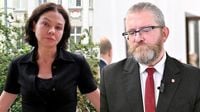In a striking public rebuke, Monika Braun, sister of Polish presidential candidate Grzegorz Braun, has voiced her deep disapproval of her brother's recent political actions. In a heartfelt letter published in Tygodnik Powszechny, Monika expressed her shame over Grzegorz's behavior, stating, "I am his sister and I am ashamed of what Grzegorz does. I am personally hurt by the ruthless gestures and words that he directs to so many people." This candid admission has sparked discussions about the implications of political rhetoric in Poland.
Monika Braun, who is also an actress and a lecturer at the Academy of Fine Arts in Wrocław, reflected on the dramatic transformation her brother has undergone over the years. She reminisced about Grzegorz as a "gentle, nice blond boy" from their childhood, contrasting that image with the man he has become today—one she describes as exhibiting "contempt for others" and a propensity for violence.
The catalyst for her public criticism was an incident involving Grzegorz's aggressive confrontation with Gizela Jagielska, a gynecologist from Oleśnica. Monika characterized this event as a "complete disregard for legal and social norms" and an unwarranted attempt to infringe upon women's rights. She emphasized that this was not the first time her brother had attempted to control women's bodies. "Not for the first time does a man want to manage a woman's body—this one and others. Not for the first time does he feel entitled to do so," she lamented.
In her letter, Monika Braun articulated her sorrow and frustration, stating, "The boundary has finally been crossed." For years, she had refrained from publicly criticizing her brother, adhering to the principle of not tarnishing one's own family name. However, the recent events compelled her to break her silence. "I do not recognize the delicate, attentive boy I grew up with," she wrote, highlighting the emotional toll of witnessing her brother's transformation.
Monika's letter delves into what she describes as a broader societal issue, which she refers to as the "politics of contempt." She warns that her brother's behavior is not an isolated phenomenon but rather part of a disturbing trend. "Contempt, pride, and violence—all beginning with 'P,' like the country he would like to govern—are not atrophying but multiplying," she cautioned, underscoring the potential social ramifications of such rhetoric.
She hopes her words will resonate with others and spark a critical dialogue about the normalization of violence and contempt in political discourse. "I hope that the demand for violence, known to us from so many areas of social life, will finally decrease," Monika expressed, reflecting on the urgent need for change.
Grzegorz Braun, a controversial figure in Polish politics, has long been known for his provocative statements and actions. His political career has been marked by polarizing views that often elicit strong reactions from both supporters and critics. The recent outcry from his sister adds another layer to the ongoing discourse surrounding his candidacy and the values he represents.
Monika's public criticism is significant not only as a familial dispute but also as a reflection of the broader societal concerns regarding political rhetoric in Poland. As the nation approaches the upcoming presidential elections, discussions about the impact of candidates' words and actions on public sentiment and social norms have intensified.
In her poignant letter, Monika Braun has taken a courageous step in speaking out against her brother's conduct, challenging the status quo and calling for accountability in political discourse. Her hope is that by sharing her perspective, others will feel empowered to voice their concerns and contribute to a more respectful and compassionate political environment.
As the political landscape in Poland continues to evolve, the implications of Monika's statements may resonate far beyond her family, influencing public opinion and the way political figures are held accountable for their words and actions. The intersection of personal and political narratives is a powerful reminder of the human impact behind the headlines.
In a time when political divisions seem to deepen, Monika Braun's heartfelt plea serves as a call for empathy and reflection. It challenges individuals to consider the weight of their words and the responsibilities that come with public discourse. As the elections draw near, the question remains: how will this family rift impact the broader political landscape?





